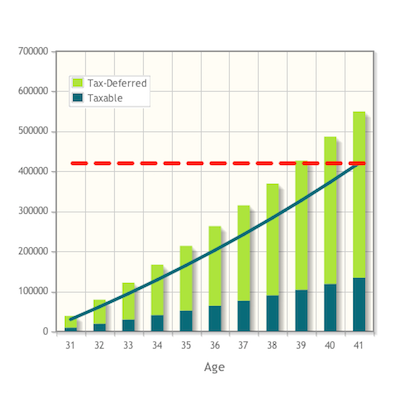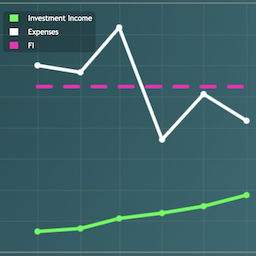In part two of the Radical Personal Finance podcast interview (click here for part one), we dive into some very powerful tax-avoidance strategies for future early retirees.
It’s possible to achieve financial independence earlier in life, without having to decrease your spending, increase your income, or assume any additional risk, simply by using tax-advantaged retirement accounts in an intelligent way.
Today’s episode explores the various retirement accounts available and explains the most optimal uses of those accounts for people on the path to financial independence and early retirement.
Listen Now
- Listen on Spotify or Apple Podcasts
- Download MP3 by right-clicking here
Highlights
- Traditional IRA vs. Roth IRA
- Roth IRA Conversion Ladder
- The Super IRA
- How to Get a Free Education




This is really good stuff. I appreciate the way you think about and attack these ER considerations with the main point of limiting the bite of taxes. This is something I rarely think about and would do me a lot of good to understand this better. I never knew the tax code could be so beneficial to ER’s. Keep up the good work.
Thanks a lot, Buck.
Great posts on cFIREsim, by the way. I’m really looking forward to playing around with some scenarios and testing out the various withdrawal strategies!
Glad to hear you’re getting some benefit from Bo’s retirement simulator. I really think he’s got something special there.
I definitely agree!
Can’t seem to listen to the podcasts. Do you need a certain kind of software? I don’t have an mp3 player and I assume my oldish computer doesn’t have that software so maybe that’s the problem? Can you post them some other way?
Hi Nancy, are you able to right click on the link and then download the file to your computer?
If not, do you have a different browser you can try? You shouldn’t need any special software but it’s possible you’re using an older browser that isn’t supported.
If you’ve used iTunes before, you can also subscribe to the podcast there and then listen through iTunes.
Let me know if any of those options work. If not, there are a few more things we can try.
Found them on iTunes, thanks.
Thanks for sharing this info. I just took two pages of notes! A few things I wasn’t clear on:
– You said we could withdraw cash from an HSA tax free for any reason… is that any MEDICAL reason or actually ANY reason?
– Can you with draw that cash at any time? You mentioned that it becomes like a traditional IRA after 65 (or 59.5?), so just to be clear, isn’t then critical to empty the account at 64?
– I noted a savings in medicare, where exactly do you save on that? Do we not pay medicare from any income if we have an HSA?
Sorry about the list of questions I posted earlier, all of them were answered in “The Ultimate Retirement Account” blog post!
Hey John, I’m glad to hear you got so much out of the podcast episode.
I’m also glad to hear the Ultimate Retirement Account article answered all of the questions you had!
If you have any other questions about anything, let me know and I’ll do my best to answer them.
Great podcast! One quick question, if you wife is still working (even part-time), how are you still going to be able to transfer your traditional IRA to a roth without paying income taxes? Thanks!
I am enjoying listening to all of your podcasts. I too opt for the traditional 401k. (403b) in my case. Our combined income is low enough, so we max out our Roth IRA accounts after maxing out our employers plans.
Also, your conversion plan is also brilliant.
Quick correction that you may have made elsewhere: Roth contributions can be taken out at any time, for any reason with no tax or penalty. The growth has to stay in until you’re age 59.5, and conversions are treated differently.
Keep up the great work – this is good stuff! I like that you’re confident, but still open to different/new ideas. We need that in the community. In fact, I’d say it’s a cornerstone of it!
I have been listening to MF via YouTube. I am in my 50’s gleaning whatever I can. My employer generously deposits 10% in a Money Purchase Pension Plan. And about the same in bonuses each year. I am unclear if the MPPP is pre-tax or not.
I have a IRA and just started a 2nd Roth IRA for my wife. We earn too much to get an annual tax credit. These are after tax accounts but they allow us to stash $6,500 for each of us. My wife does have about $10K of small business income. Possibly 20% SEP.
We may be able to save $44K this year. Thank so much for your podcasts. They’re inspirational and make my commute easier.
Thanks
Hey MF,
Relatively new reader here loving your stuff. I work in the finance industry and have a pretty high level understanding of all of the concepts you speak of. I went back and started at the beginning with your podcasts. One thing that has been mystifying me is on the Traditional to Roth conversions, I like to call them “Backdoor Roth Conversions.” You continuously mentioned converting 9k/year. How is this possible with the contribution limits of $5,500 and $6,500 catch up over age 50??
Gcap…converting a Traditional IRA to a Roth…think of as a “rollover” and not a “contribution”. So you do not have the limits on contributions.
I use Hello Further as my HSA administrator. It allows me to invest any balance over $1000 with Schwab. Fees are $1 a month for Hello Further and $28 a year I think for Schwab. I understand that some big brokerages are now starting to enter the HSA Administrator field and are bringing the costs for Admin way down below what I have as of Jan 2019 at this time of comment.
Interesting material that I wish I was listening to years ago! For clarification, there is no mathematical difference between the money you will end up with in a Roth vs Traditional IRA, provided your return assumptions and tax rate assumptions are the same. However, figuring out if your tax rate will be higher now or in the future is where you can get some real separation. Obviously future tax rates are an unknown, and part of that unknown tax rate is also driven by the amount of income in question. My general take is that earners far into their career with high salaries and operating within relatively high tax brackets are better off going traditional IRA, whereas younger folks just beginning to climb the salary scale in relatively low tax brackets are better off going Roth IRA.
Hey MF,
Just recently started listening to your podcasts and am thoroughly enjoying them! Loved all the tax advice. One thing I didn’t hear you guys mention was long term capital gains benefits. If it is your only source of income, you can reap $40k (joint returns $80k) tax free in 2020. I think it’s an incredible tax free consideration for some. Just wanted to mention it.